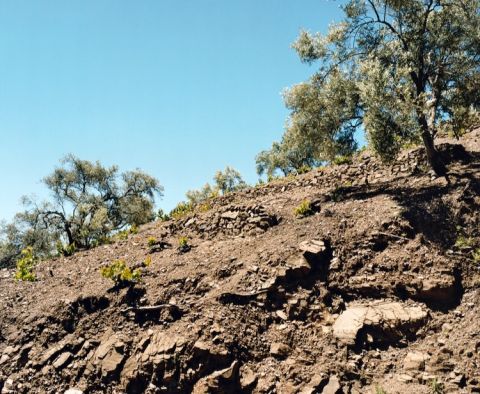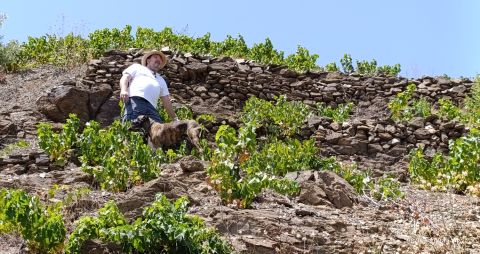It’s a miracle that these old Moscatel de Alejandria (Muscat of Alexandria) vineyards, pictured above by Jason Orton, at elevations of 550–1,000 m (c 1,800–3,300 ft) in the villages of Cómpeta and Archez in Axarquía in eastern Málaga have survived. The oldest are more than a century old, the youngest were planted in the 1980s. This is the driest part of Málaga and is better known for the production of sweet wine made from sun-dried grapes as well as for raisins. Tropical fruits such as mango and avocado have taken the place of traditional crops, including vines and olives, though they require far more water, an increasingly scarce resource.
Telmo Rodríguez, roving Spanish winemaker and would-be historian who also owns and runs his family estate Remelluri in Rioja Alavesa, describes these vineyards as ‘radical, pure slate’.
The farming of the diminutive traditional bush vines, interplanted with olive trees on steep slopes, has been handed down through the generations but, Rodríguez warned, ‘the old growers are disappearing and becoming victims of the tourists that are buying their cortijos [traditional Andalusian farmhouses] to transform them into small villas’. As well as wanting to rediscover wines in the lost corners of the Spanish landscape, he and his business partner Pablo Eguzkiza wanted to support the local farmers. (Their other such projects include Lanzaga in Rioja Alavesa, Ladeiras do Xil in Galicia, Viñedos de Matallana in Ribera del Duero, Pegaso Viñas Viejas in the Sierra de Gredos and Gago Viticultores in Toro.)
When Rodríguez and Eguzkiza set up Molino Real (‘Royal Mill’) in the late 1990s, it was with the intention of reviving the tradition of sweet Mountain Wine, which used to be ranked alongside great sweet wines such Tokaji, Sauternes, German Riesling, Madeira, Vin Santo and Vin de Paille. According to the Molino Real website, ‘Christie’s, in its first wine auction in 1769, offered wines from Malaga along with the best Rhine and Burgundy. We decided to learn.’
When they started, Rodríguez explained, they had not realised that the dry Moscatel wines were also very good and part of the local tradition. At first they thought the dry whites were ‘easy’ wines but then they discovered that with more time in the bottle, they became ‘pure and complex’. At that point they changed the bottle shape and label from a very plain version to the beautiful traditional packaging they have now.
The 2021 vintage is still youthful but the extra two years in the bottle have transformed it into a highly original white wine, which starts out with a marked grapey aroma before revealing scented wild herbs and vibrant green fruits. As it continues to open in the glass, there’s what I can only describe as a ‘fumy’ aroma that reminds me of Riesling that has been fermented with ambient rather than cultured yeast. Despite the heady mix of aromas, the wine is bone dry even if there is a fullness and generosity in the mouth. It’s intense and long and remarkably fresh. Alcohol in this vintage is 13.5%.
The wine may not appeal to those who prefer their white wines to smell steely and taste lean but I found the combination of aromatic complexity, intensity and a long, dry finish captivating – so much so that I had to keep returning to the glass to discover more. I am looking forward to trying this wine after even longer in the bottle and I suspect it will be still going strong in five years.
Resident winemaker, Frenchman David Dupuch (below), arrived for a season in 1997, planning to return to run his family estate in the Gironde, but that’s not how things panned out and he started to spend more and more time in Andalucía making Mountain Wine with Rodríguez. Dupuch has found Andalucía particularly welcoming, with no barriers to a Frenchman once he had learned the language. (He had learned Castilian Spanish at school but Andalusian Spanish ‘has a few subtleties’, he told me.)
Dupuch explained that the winemaking is similar to that for many a dry white wine – settling of the juice followed by long, cool fermentation in tank – but the heterogeneity of the 100 or so parcels that make up their 30 ha (74 acres), in terms of elevation, exposure, slope and soil, means he has to be very selective as to which fruit goes into the dry and which into the sun-dried sweet wines. They did not start making the dry wine until the early 2000s when they found that some of the grapes their growers brought to them were not suited to drying and making into sweet wines but, as he explained, it was difficult for them to buy only some grapes and reject others.
The parcels best suited to the dry wines are not the same in every year – one site might be ideal for the dry wine in a wet year but much better for a sweet wine in a hot, dry vintage. ‘Like a sailor, we have to navigate with the wind’, Dupuch explains. All the grapes have to be harvested by hand – no chance of getting a machine harvester into these vines even assuming the farmers could afford such equipment – and those for the dry wines are picked around three weeks earlier. The pressing does not need to be as powerful as for the dense must of the raisined grapes, though the size of the berries and the amount of pulp makes pressing difficult even for the fresh berries.
The wine is aged 9–12 months in bottle before being released. You could drink it on release but I am delighted to see that it’s this 2021 that is currently on the market. They are not able to make much, around 9,000 bottles per year, according to Rodríguez.
With his customary enthusiasm for beautiful wines, Rodríguez suggests these dry and sweet Moscatels from Axarquía exemplify the history of Spanish wine: ‘Quite decadent [in a state of decline] but with an amazing future if the new generation is able to restore and give light to some of the most amazing terroir of the old world ... we are proud to have been investing our energy in an impossible wine, we never did great business, we lost money but it is one of the wines we are most proud of’.
Imported into the UK by Liberty Wines and currently available from Berry Bros & Rudd, Hedonism and N Y Wines. The US importer is De Maison Selections; contact tgallagher@demaisonselections.com and press@demaisonselections.com for information on retailers in your area.
Also available in Finland, Germany, the Netherlands, Poland and Spain.
There are many more reviews of wines from Málaga and from the various projects of Telmo Rodríguez in our tasting notes database.
















